
- Teacher: Elena Mizrahi
- Teacher: Konstantinos Petridis

This course is designed to enhance students’ proficiency in Business English while equipping them with essential communication and intercultural skills for global professional environments.
Through practical modules covering effective writing, intercultural communication, leadership, entrepreneurship, and business etiquette, students will learn to navigate workplace communication with clarity, precision, and cultural sensitivity. Emphasis is placed on understanding cultural models, developing written business documents, working in transnational teams, and preparing for real-world interactions. This interdisciplinary course blends language development with cultural awareness, fostering the competencies needed to function effectively in international and multicultural professional contexts.
By the end of this course, students will be able to:
1. Demonstrate the ability to write clear, concise, and coherent business documents such as emails,
memos/minutes, reports, resumes and application letters/letters of motivation.
2. Apply principles of effective written and verbal communication tailored to professional business
contexts.
3. Analyze the influence of culture on communication and behavior in global business settings.
4. Interpret and adapt communication strategies based on cultural dimensions (e.g., Hofstede’s and Hall’s
models).
5. Identify common barriers to intercultural communication and employ strategies to overcome them.
6. Evaluate leadership styles and organizational culture from a cross-cultural perspective using the
GLOBE framework.
7. Engage effectively in team-based activities with cultural sensitivity and confidence.
8. Reflect on personal cultural identity and its impact on professional communication and interaction.
9. Design and format a current and effective CV/resume and Motivation Letter(s) for job/internship(s).
10. Prepare a video pitch to launch a project or product in the international scenario.
11. Analyze and give feedback to the other students' written and oral production.
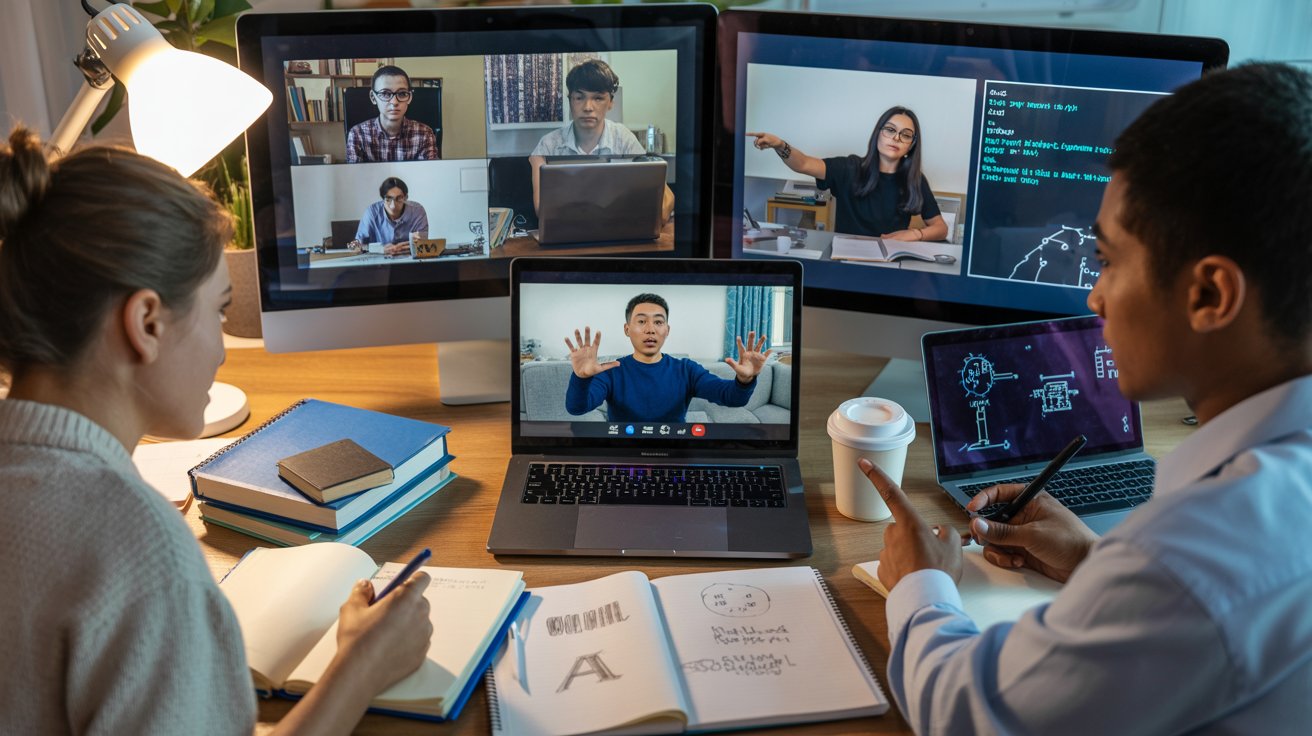
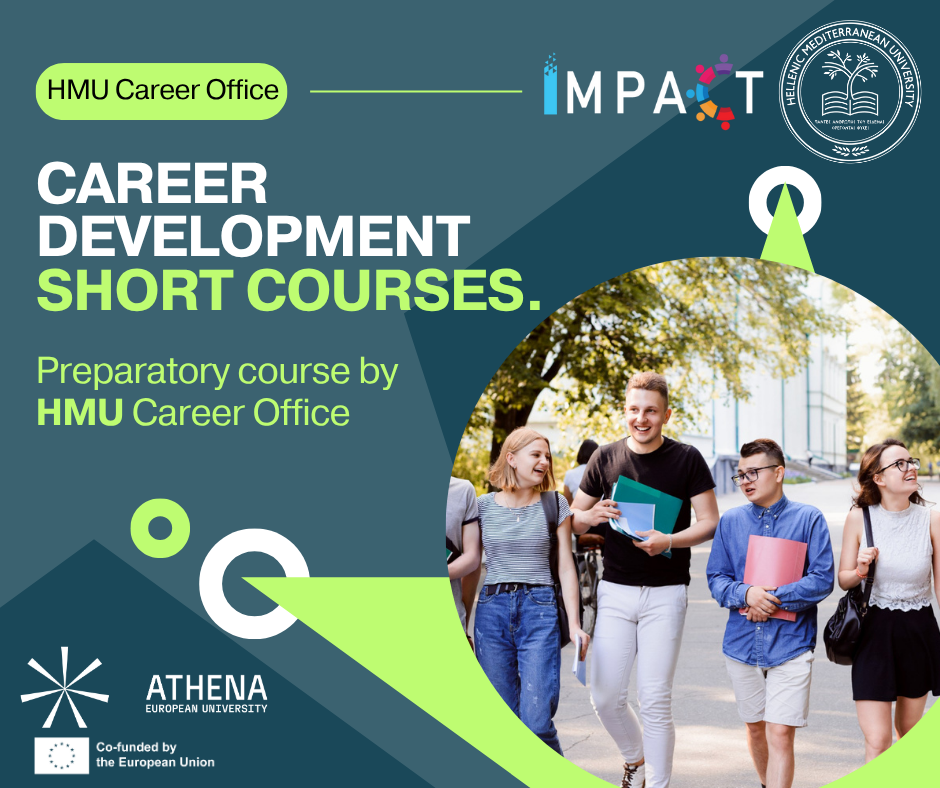
To prepare students to be more employable. This will occur through lecture sessions, and experts will deliver webinars from the Job and Career Services. Moreover, the students will interact with each other in case scenario sessions.
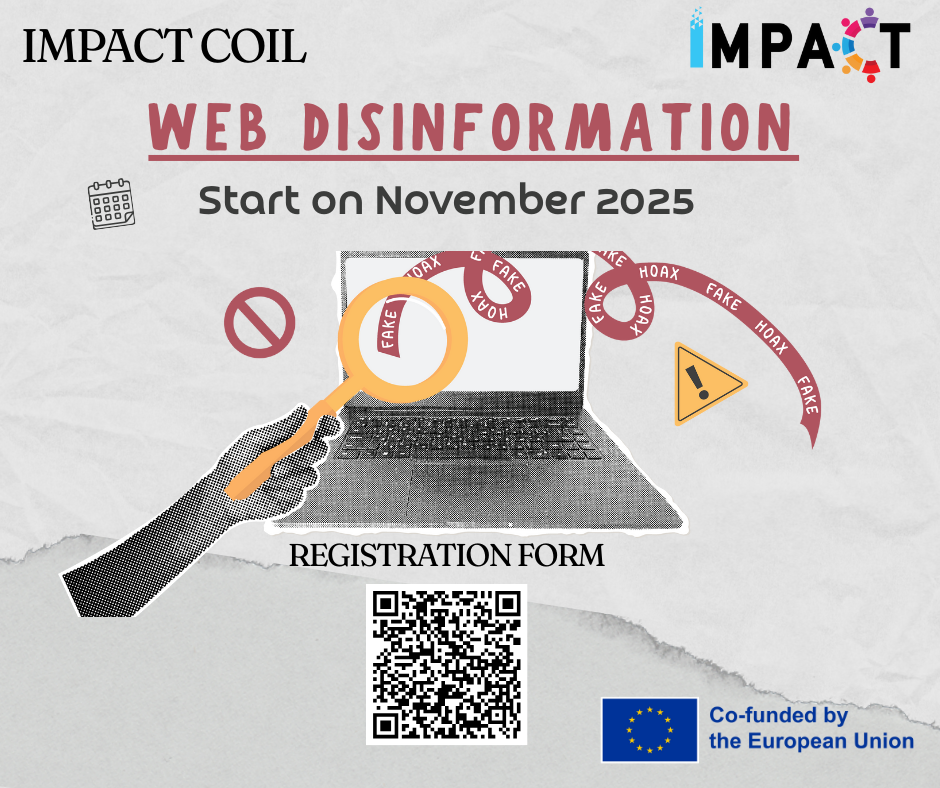
This course explores the impact of disinformation on democracy and intercultural dialogue. We will analyze how the spread of fake news, information manipulation, and filter bubbles influences political participation, minority perceptions, and social cohesion. Additionally, this course focuses on new technologies, artificial intelligence, and digital governance. We will examine the mechanisms of disinformation dissemination, the challenges of European regulation, and EU-funded projects aimed at countering information manipulation.
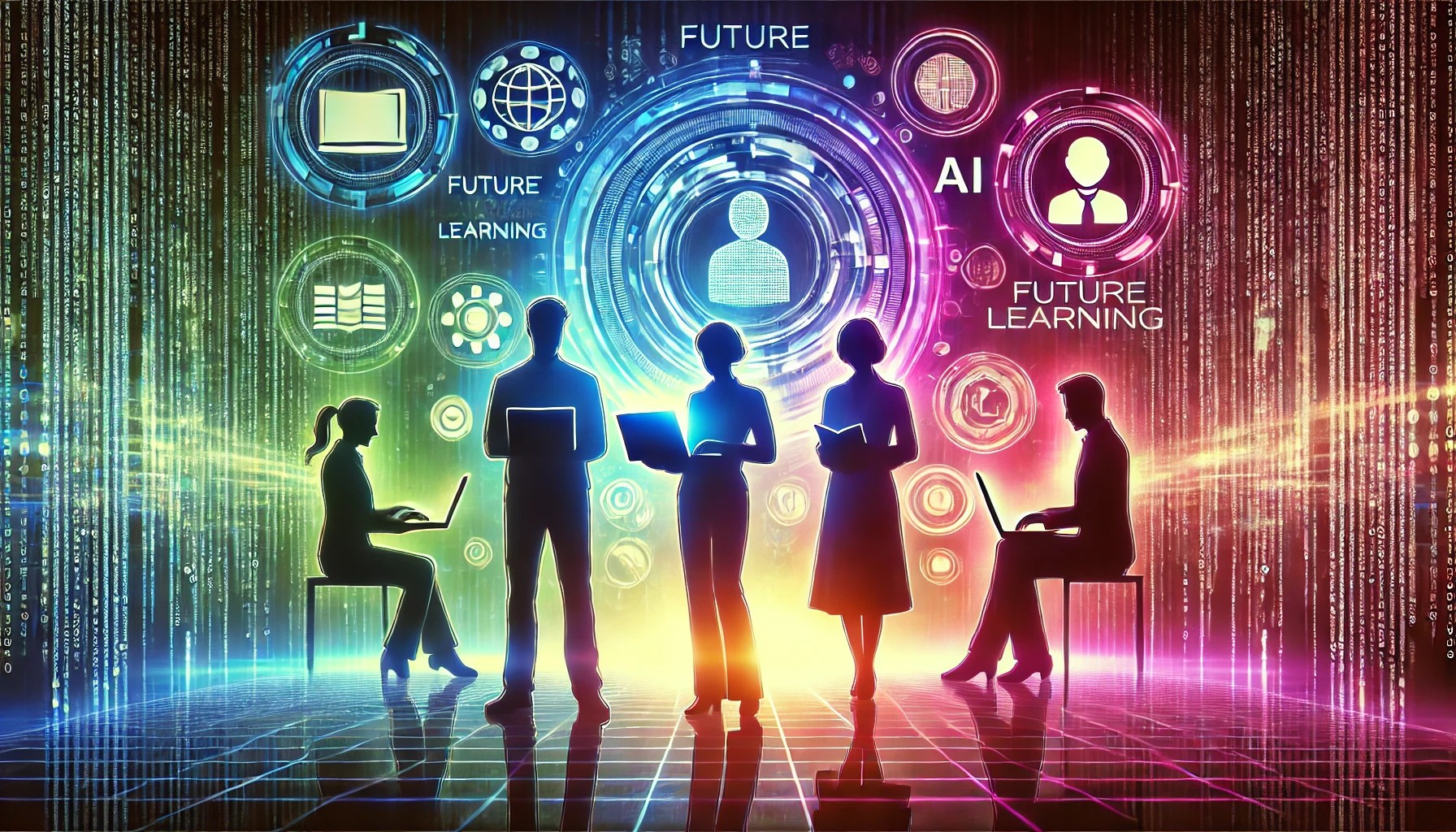
This joint international course will equip you with a comprehensive set of 21st century skills to navigate the modern workplace confidently and competently. We will dive into AI's technical, cultural, and ethical aspects, learn about the application of different AI tools, project management, and event planning, culminating in a student-organized online (blended) conference.
The course is conducted in English on ZOOM every Wednesday, and students from around the world join from 16:00-18:00 (Israeli and Greek time), 15:00-17:00 CET, and 9:00-11:00 New York time.
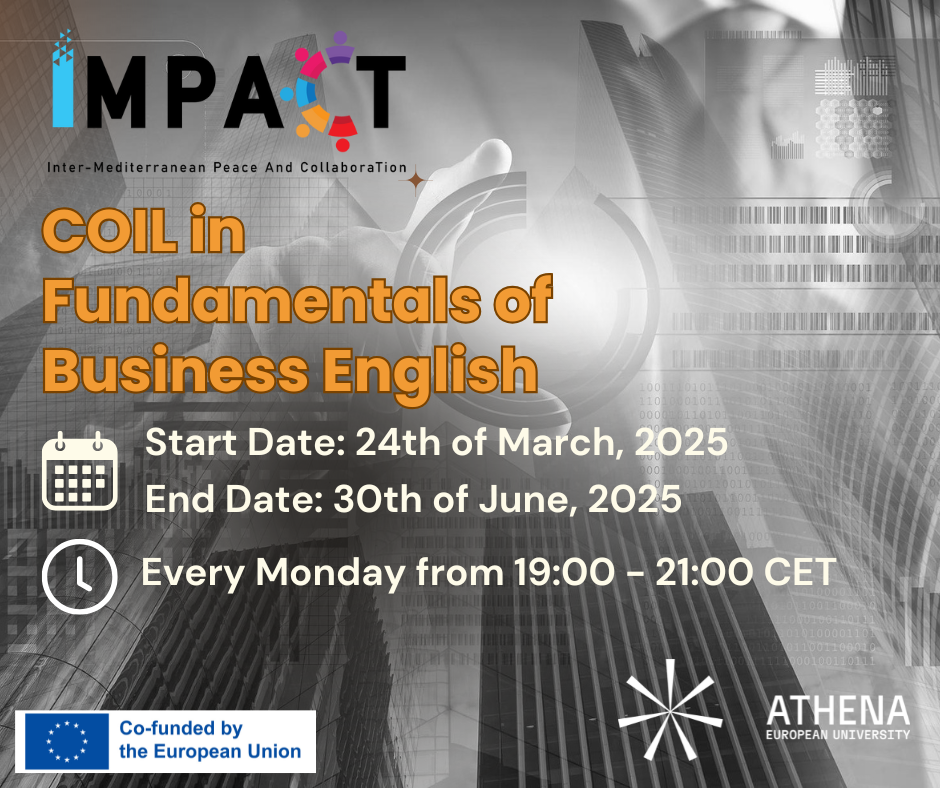
This COIL program is designed to develop knowledge of the fundamentals of Business English with a practical focus in multicultural and international settings.
The course builds confidence in speaking, listening, reading, and writing English in international business contexts. Students will gain insight into diverse aspects of the field of business. Students will increase their vocabulary and practice using Business English in everyday business situations on the telephone, in meetings, in presentations, and negotiations. They will sharpen their communication and active listening skills through guided in-class exercises. Technical writing abilities will be enhanced, focusing on precise, well-structured tasks by writing formal and informal emails. Speaking skills will be improved by participating in pretend meetings, interviews, and role-plays.
Additionally, students will enrich their comprehension of Business English through texts on diverse subjects. Finally, students will learn how to create an oral presentation, which will be given to the class as a team project. The course will foster collaboration & teamwork among the students. All these skills will increase the employability of the participants.
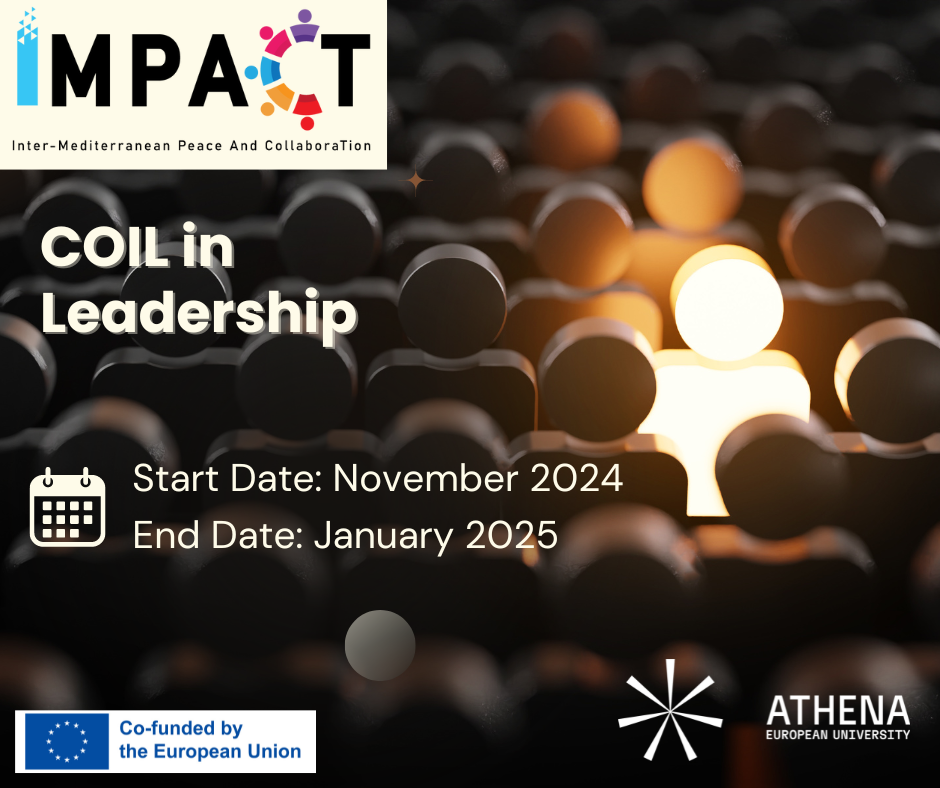
This course explores leadership across various fields, unpacking the core principles and practices that make a leader effective in different contexts. Students will gain insight into diverse leadership styles, engage with guest speakers, and develop their leadership vision.
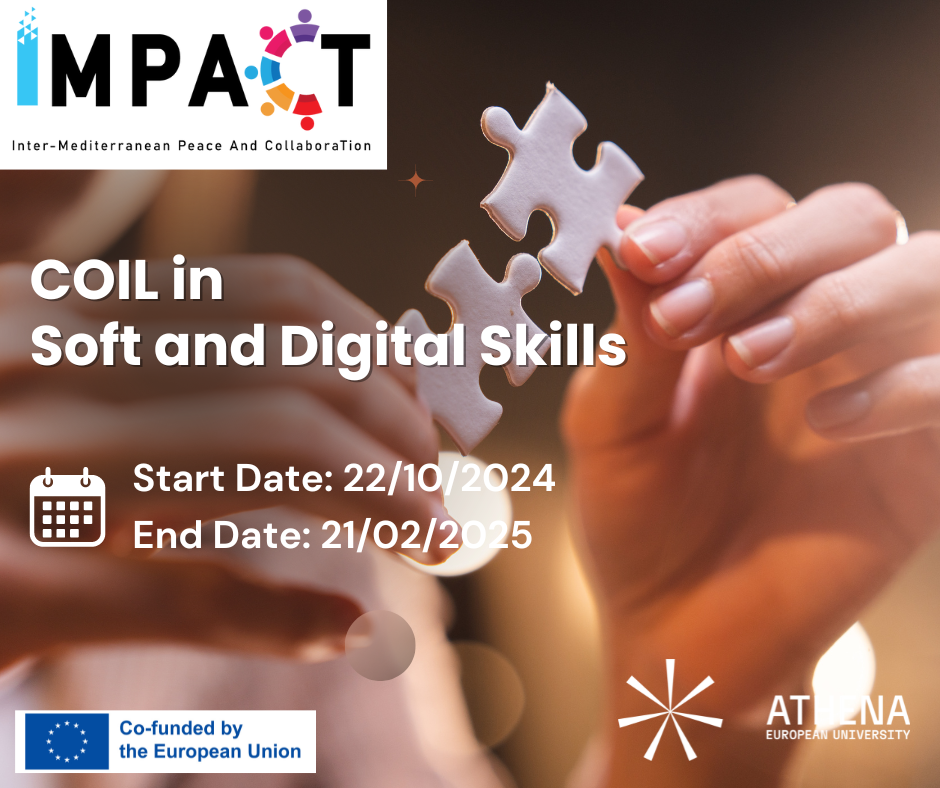
This COIL is designed to develop the soft and digital skills most wanted in the AI era. In addition to digital literacy, several soft skills are increasingly critical for success across various fields. Here are some essential soft skills: (1) Emotional Intelligence, (2) Critical Thinking, (3) Adaptability, (4) Communication Skills, (5) Creativity, (6) Collaboration, (7) Cognitive Flexibility, and (8) Ethical Judgement and Integrity. In this course, the students will be exposed to various AI tools necessary for learning in and beyond academic life.
While practicing with different digital apps, students will learn to understand and manage their emotions and empathize with others. They will also be introduced to analyzing situations, identifying problems, and developing practical solutions, which is essential as AI takes over routine tasks. Because of globalization, students should also be flexible and open to change. Clear and verbal communication, both written and verbal, is vital for peer collaboration and interaction with AI systems. Another skill students will be exposed to through our lectures and activities is to think out of the box. This is the driving force of innovation and a skill that will distinguish us from machines. Working well in teams, often in interdisciplinary and cross-cultural contexts, remains crucial as AI facilitates more integrated work environments. Students will engage in multiple team projects to enhance these collaboration skills. One of the significant challenges in the AI era is understanding the ethical rules and how to apply them. Students will be introduced to copyright laws, creative commons, and plagiarism issues, laying the groundwork for ethical considerations in AI use.
The course will provide hands-on experience with various digital and AI tools, including note-taking apps, cloud services, collaborative presentation software, and AI-powered research tools, ensuring students are well-prepared for the technological demands of modern academic and professional environments.
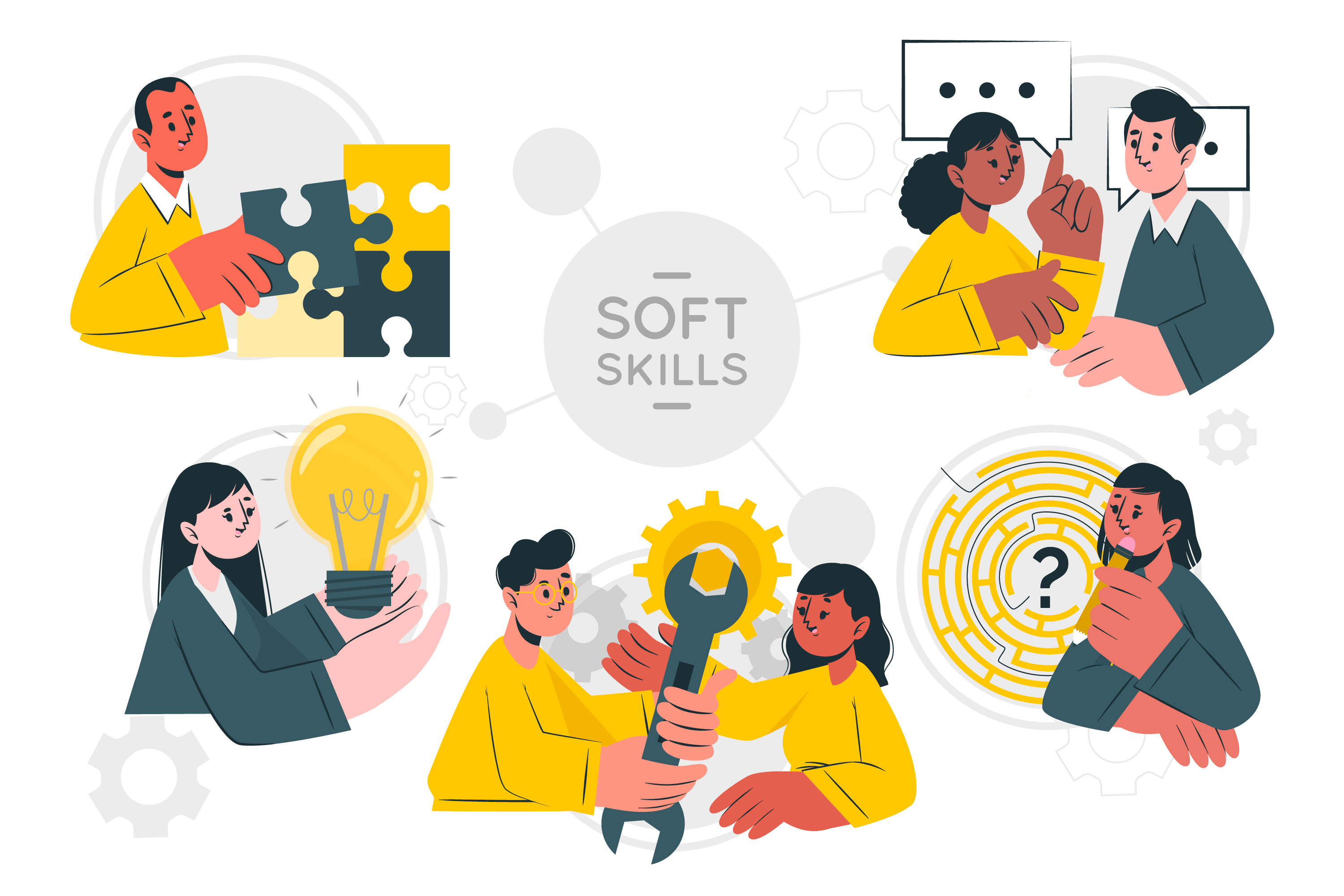
This COIL is designed to develop critical research skills with a practical focus. Students will learn to analyze and evaluate information critically, conduct comprehensive literature reviews, and design robust research methodologies for both qualitative and quantitative studies. They will also be introduced to how to read, write, and submit their scientific work, preparing them for real-world research scenarios. Technical writing abilities will be enhanced, focusing on clear, well-structured reports and proposals with proper citations and academic integrity. Students will improve their presentation skills and learn to communicate research findings effectively (in experts and non-experts) through oral presentations, posters, and digital media. Project management principles, including planning, organizing, and managing research projects, will be taught to ensure efficiency. Emphasis will be placed on ethical research practices, collaboration, and teamwork, fostering effective communication and problem-solving within interdisciplinary teams. This course equips students with the skills necessary for high-quality research and significant contributions to their fields.
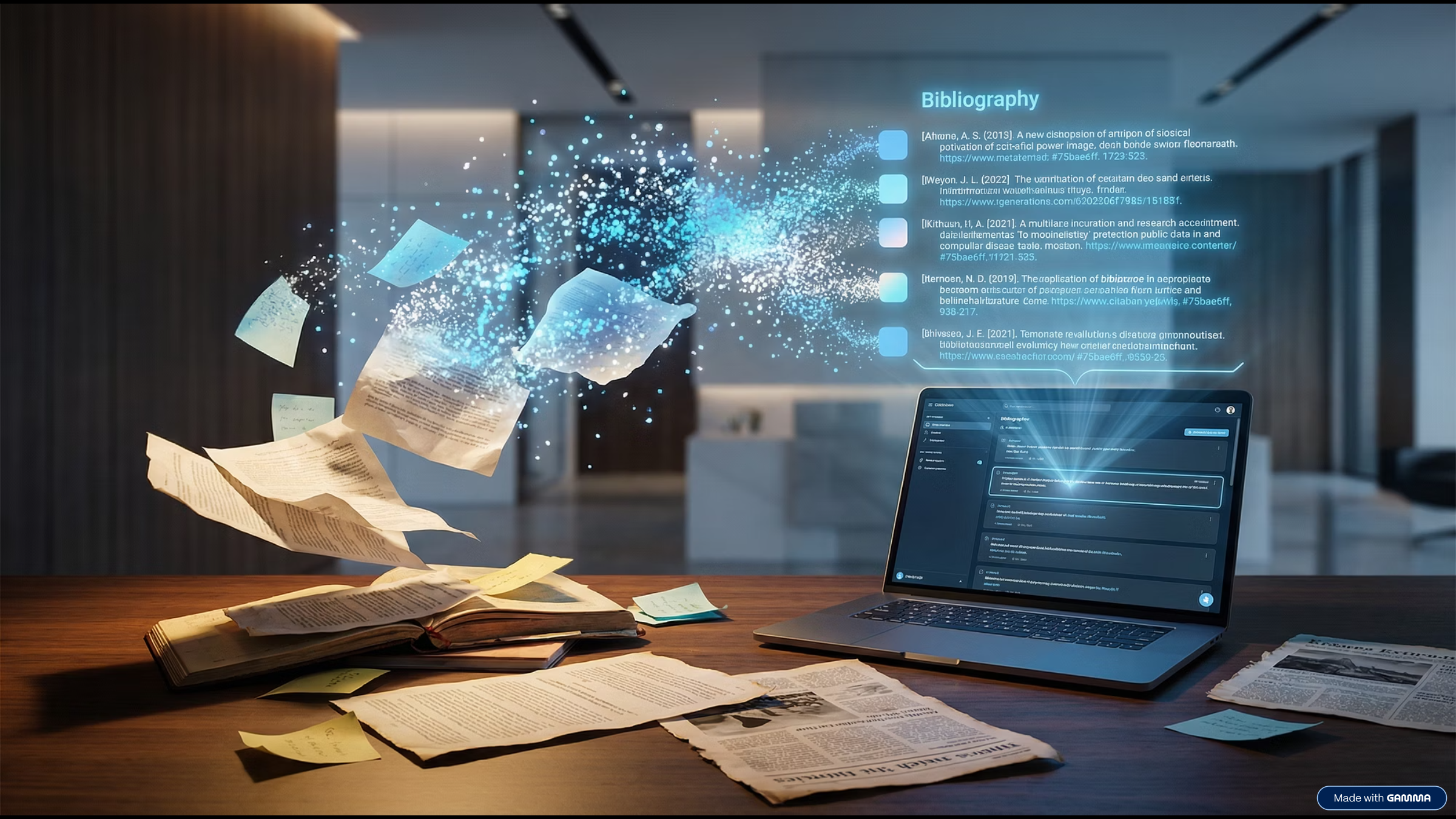
This is a course that aims:
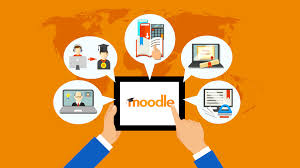
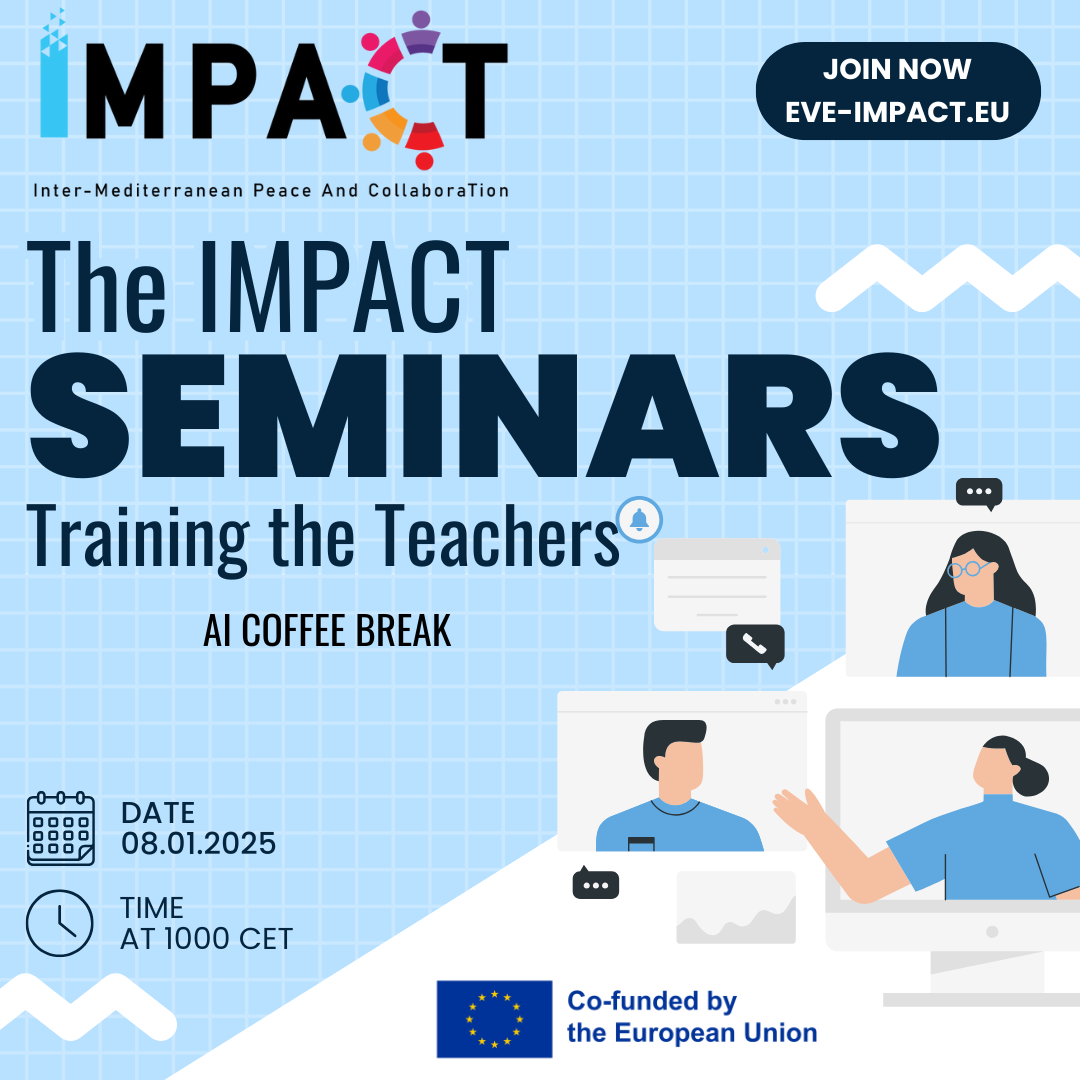
The Erasmus Virtual Exchange Project IMPACT organizes online seminars to integrate AI tools into teaching practices effectively. Tailored specifically for educators, these sessions aim to equip teachers with the knowledge and skills to enhance their pedagogical approaches using AI-driven technologies. The seminars will explore practical applications of AI for lesson planning, student engagement, personalized learning, and assessment. Beginning on the 8th of January 2025, this series offers an interactive platform for educators to exchange ideas, share experiences, and discover innovative methods to adapt AI tools for their classrooms.
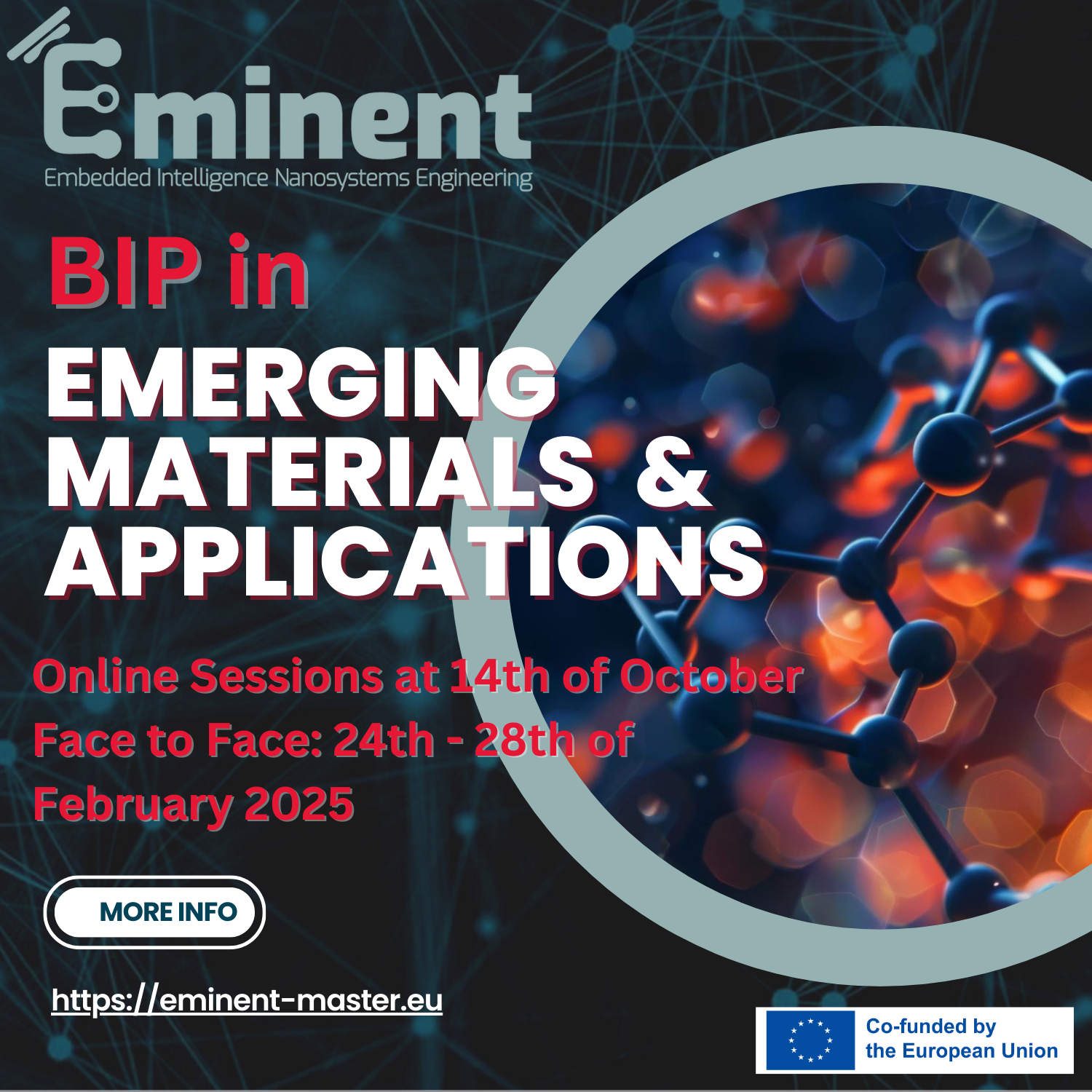
This Blended Intensive Program aims to provide students with fundamental knowledge of emerging materials employed in Nanotechnology. Moreover, during the online and face-to-face activities, the students will be exposed to fabrication and characterization processes and applications in various fields, including printed electronics, sensors, robotics, and IoT.
The face-to-face workshops will occur from the 24th to the 28th of February 2025 in Heraklion, Crete.

This is a course devoted to IMPACT and beyond IMPACT specialists to discuss with our participants topics related to the project: Online accreditation tools such as micro-credentials, blockchain technology, and open badges; Citizen and civic Science; pedagogical tools like LMS platforms, and AI tools for Higher Education.
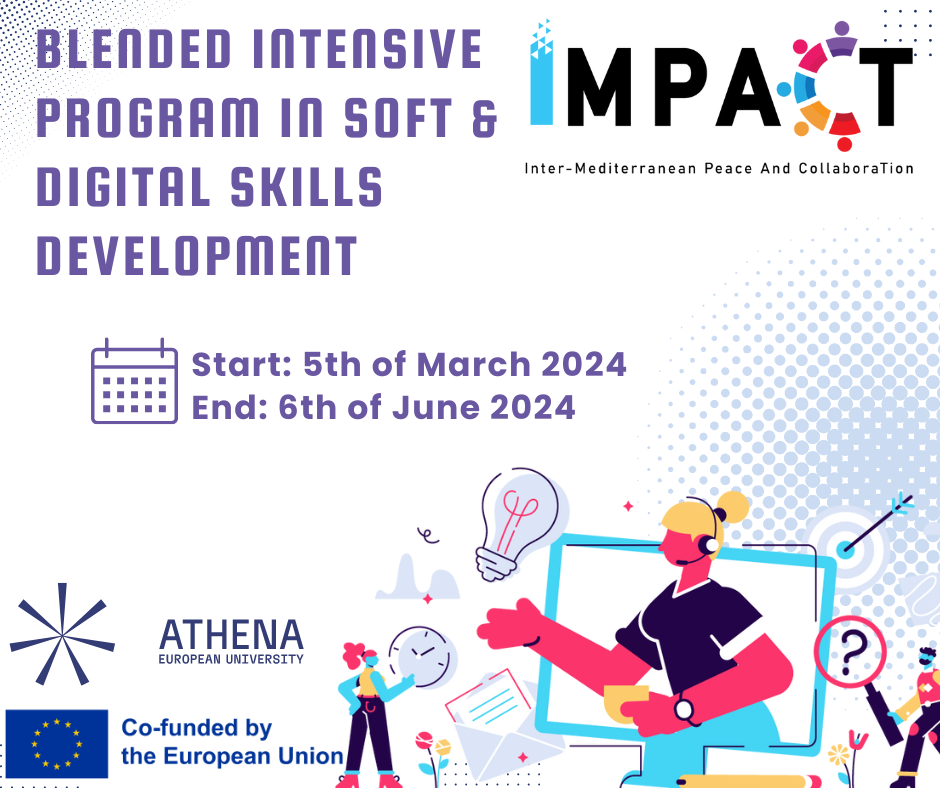
This online course aims to teach and practice soft and digital skills that the AI era is looking for. The course will consist of online sessions repeated every Wednesday at 1500 - 1700 CET using the Zoom platform.
The course will end with face-to-face workshops will be hosted by the Hellenic Mediterranean University in Chania from the 27th to the 31st of May 2024. All the information can be found here: https://11iw.hmu.gr/athenasoft-blended-intensice-program/
During the online sessions, the students are strongly encouraged to switch on their cameras and interact with the lecture facilitator.
In some cases, when another interesting lecture takes place on another date of the scheduled slots, the students will be notified to attend it.
I hope that you will enjoy the course.
Best
Kostas
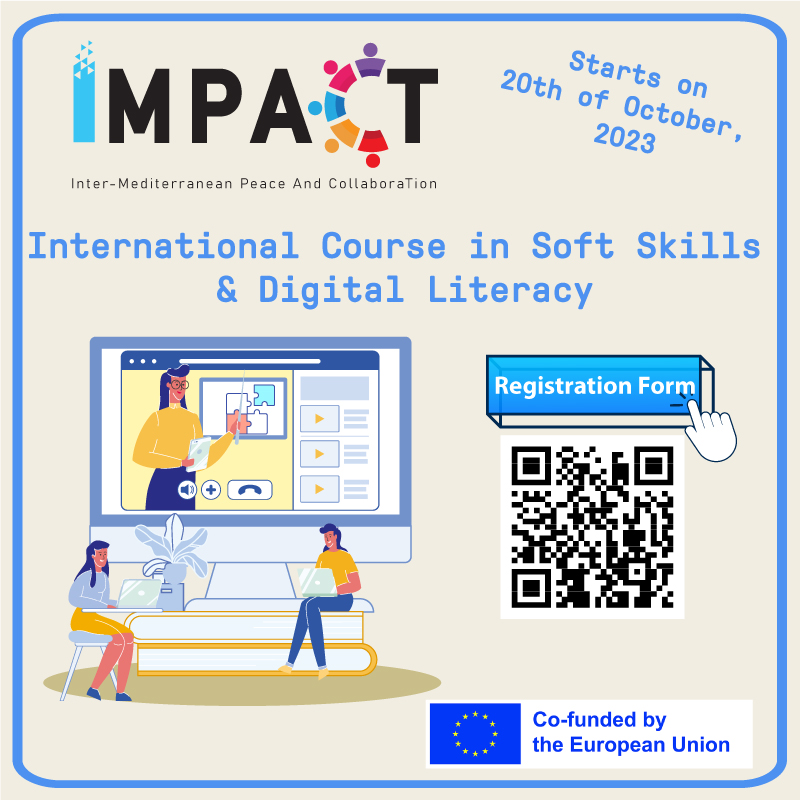
In today’s rapidly evolving digital landscape, integrating soft skills with digital literacy is paramount for professionals seeking to thrive. This comprehensive online course is designed to equip participants with a unique blend of interpersonal skills and digital competencies, ensuring they remain agile, adaptable, and effective in both online and offline environments.

"Soft skills" refer to non-technical, interpersonal, and communication skills essential for success in the workplace and life. These skills complement hard or technical skills, which are specific to a job or task. Soft skills have gained significant attention in recent years for several reasons:
Human Interaction: No matter how advanced technology becomes, human interaction will always be at the core of business and personal relationships. Effective communication, empathy, and teamwork are vital for building and maintaining these relationships.
Complex Problem Solving: While technical skills may equip someone to solve clearly defined problems, soft skills often come into play when problems are more ambiguous—critical thinking, creativity, and adaptability help in navigating complex issues.
Emotional Intelligence: Recognizing, understanding, and managing our own emotions, as well as the emotions of others, is key to building strong relationships and making sound decisions.
Adaptability in the Workplace: The modern workplace is ever-changing. Employees who can adapt, manage change, and help others navigate transitions are invaluable.
Leadership and Management: Leadership isn't just about setting a vision and inspiring, motivating, and guiding others toward that vision. This requires various soft skills, including communication, conflict resolution, and mentorship.
Client Relations: For client-facing roles, understanding client needs, building trust, and effectively communicating are essential to maintaining long-term relationships and securing business.
Cultural Awareness: As businesses become more global, understanding and respecting cultural differences becomes vital. Soft skills help individuals navigate these differences to build productive relationships.
Future-Proofing Careers: While hard skills might become outdated with technological advancements, soft skills like interpersonal communication, negotiation, and problem-solving remain valuable.
Increasing Automation: As routine tasks become more automated, human-centric skills, which are harder to automate, become even more crucial.
Holistic Development: On a personal level, soft skills contribute to holistic human development, enhancing social interactions and improving overall quality of life.
In essence, while hard skills might get you the job, soft skills often determine how successful you'll be in that job and how well you'll progress in your career. They play a pivotal role in fostering collaboration, boosting productivity, and ensuring sustained growth in a professional setting.
In this course, we will present the fundamentals and hold some interactive sessions with the participants.